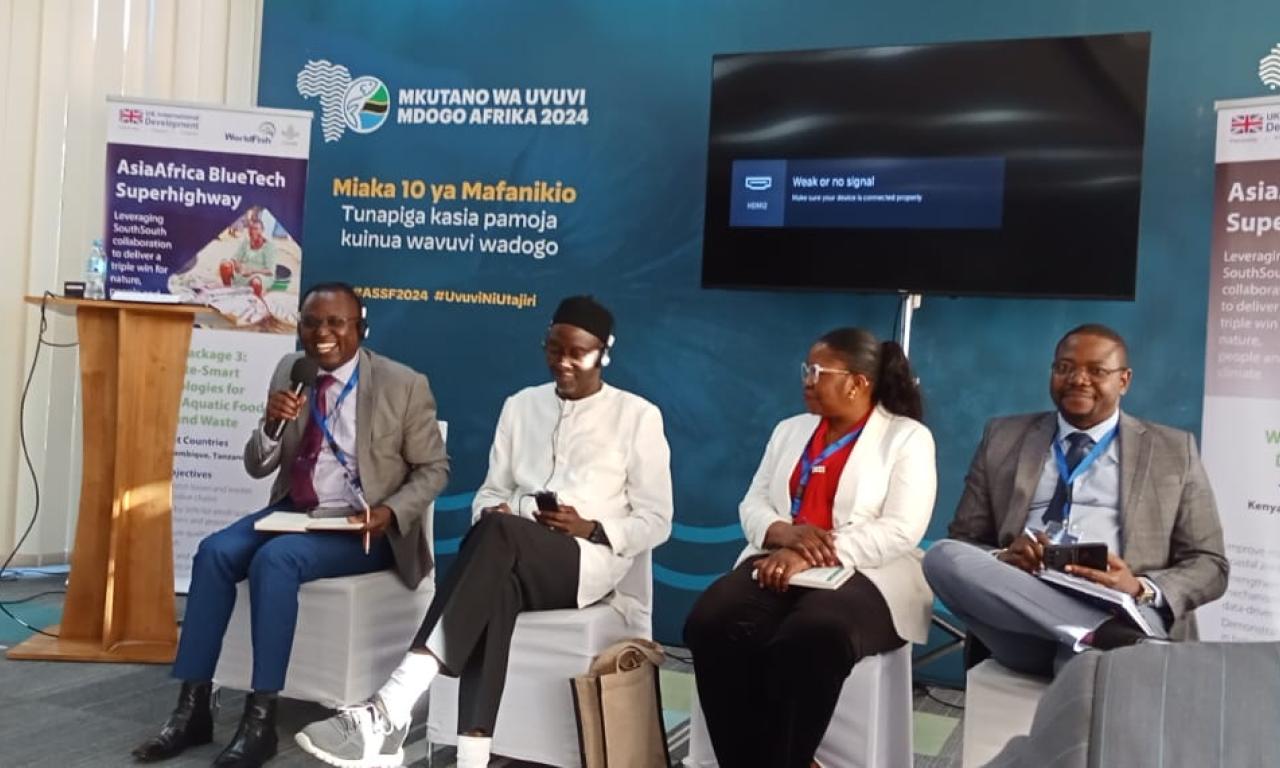
With COP29 in Baku drawing to a close this week, outcomes from the 2024 Africa Small-Scale Fisheries Summit (ASSF) held in in Dar es Salaam, Tanzania couldn't be more timely. Key takeways from the summit underscore the urgent need for climate-resilient and sustainable practices in the blue economy.
Experts at a panel discussion at the summit, convened by the Asia-Africa BlueTech Superhighway (AABS) project called for nature-positive technologies and sustainable practices to transform small-scale fisheries (SSF).
The AABS panel featured the voices of key African stakeholders in a discussion on “Unlocking Africa’s Aquatic Food Sector for Shared Prosperity”, which explored opportunities to shape international policy dialog, investments, and action on SSF.
AABS, which is implemented by WorldFish, collaborates with a suite of local organizations, governments and institutions across Africa to unlock their blue economic potential through the co-development and local adaptation of proven technical innovations. The project focuses on four areas: digitalizing fisheries management; multi-trophic aquaculture; climate-smart technologies for reducing fish loss and waste; and incentives for coastal conservation and sustainable fisheries management.
More than 200 small-scale fishers, fisheries associations, non-government organizations (NGOs), and government representatives from 25 countries attended ASSF to discuss the vital role of coastal communities in global food production and to request increased support to enhance the sustainability and social well-being of SSF ahead of the 2nd Small-Scale Fisheries Summit in Rome, Italy.
Key Takeaways
Comprised of representatives from countries and regional fisheries, economic, civil society organizations, the panel members were:
- Okeloh Namdoa, Secretary General, AFRISHNET, Kenya
- Gaoussou Gueye, President, CAOPA, Senegal
- Mateus Tembe, COO, ProAzul, Mozambique
- Editrudith Lukanga, General Secretary, AWFISHNET
- Dr Alexander Kefi, Project Coordinator, SADC
Recognizing the crucial role of women: Panelists highlighted that while men venture into the high seas to catch fish, women play a crucial role in securing the value of this labor through post-harvest preservation activities such as drying, smoking, and selling the fish. Their efforts are pivotal in achieving the AABS vision of significantly reducing post-harvest losses and waste within the value chains.
Enabling climate-resilient SSF: The panelists underlined the profound impacts of climate change on the fishing industry, emphasizing the need for adaptive strategies to mitigate these challenges. They discussed how changing weather patterns, rising sea temperatures, and ocean acidification are affecting fish populations, habitats, and migration patterns.
“Climate change, which is eroding our coasts, is literally on our doorstep,” said Gueye. “The effects of climate change, combined with the overexploitation of resources, means that fish are deserting our nets, our women no longer have fish to process, and the populations of our countries, deprived of this essential food, are going hungry.”
The panelists called for increased investment in climate-resilient infrastructure and practices, as well as stronger collaboration between stakeholders to develop sustainable solutions that can safeguard the industry and its associated livelihoods.
Capacity building: Fisherwomen must have the necessary skills, knowledge, and support systems to thrive in their profession and contribute to sustainable fisheries management and community development. Lukanga said her organization is working to achieve this goal.
Financial services: When addressing the issue of poverty among fishers, panelists stressed the need for SSF communities to have access to microloans and financial services to enable them to invest in better equipment, improve their fishing methods, and expand their operations. This can spur on the growth of SSF, alongside access to training programs on sustainable fishing practices, post-harvest processing, business management, and financial literacy.
Safety and quality of fish: Increased quality and safety of fish will lead to better profit margin for fishers. This can be achieved when fish farmers use high-quality, nutritionally balanced feed, not only to promote healthier fish growth but also to improve the overall quality of the fish meat, making it safer for consumption.
Market access: Strengthened policy frameworks and governance structures will bolster market access and facilitate fair trade for SSF.
Jörn Schmidt, WorldFish Director of Sustainable Aquatic Food Systems and panel moderator, said,
“To unlock the full potential of Africa's aquatic food sector and ensure shared prosperity, we must prioritize reducing post-harvest losses in key value chains, while simultaneously helping to increase incomes for small-scale fishers, processors and retailers.
“By strengthening policy, investing in research and innovation, and scaling successful models, we aim to develop and promote better monitoring and data collection for small-scale fisheries, encourage innovations in post-harvest loss reduction and promote incentive-based fisheries management to contribute to food security, nutrition, and ecosystem health. In addition, we will test Integrated Multi-Trophic Aquaculture (IMTA) systems as an alternative means to provide food income.”
The panel discussion contributed to the outcomes of the ASSF Summit by highlighting the critical role of women in value chains, nature-positive technologies and sustainable fishing practices that AABS aims to implement and scale to harness the benefits from the blue economy. The approach will help restore and conserve marine resources and maintain fish populations and ecosystem health, ensuring long-term viability for the African fisheries.
